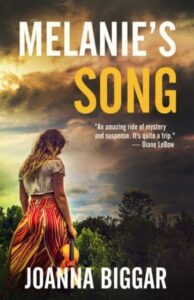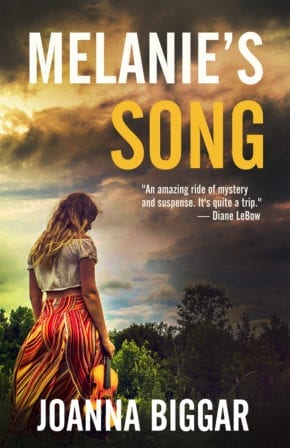At our October book launch, James J. Patterson introduced Joanna Biggar in a way only he could pull off, with passages from his personal journal.
ASP’s Fall Book Launch Party took place on October 10, 2019 at The Writer’s Center in Bethesda, MD. There James J. Patterson was giving the lofty task of introducing his mentor, Joanna Biggar, whose novel Melanie's Song was debuting that night— its predecessor That Paris Year was among the first books published by ASP ten years ago.
The evening was also, in many ways, a homecoming. It was at the Writer’s Center that James met Rose Solari, with whom he would go on to found ASP. And it was there, too, that James began taking essay writing workshops from Joanna Biggar. At the time, he was making a big life transition, leaving behind a full-time career as a singer-songwriter-performer — as Jimmy Pheromone, one half of the political folk duo The Pheromones — and exploring his gifts for other kinds of writing. During this time, Joanna was a mentor and lifeline for him.
FROM JIMMY PATTERSON'S PERSONAL JOURNAL, MAY 3rd, 1990: I need to write more, and write more seriously. I could use a bit of encouragement, though. I tried sending some letters to the more heady songwriters and players I’ve met on the road, but entertainers are a different breed, and one shouldn’t go looking for butterflies in a nest full of cock roaches. Actually, I should get away from all these musicians for a spell. My problem? Get out and meet some writers. As I drive down Old Georgetown Rd. in Bethesda, I see a sign in the window. “Writers Center.” Might be just the shot in the arm I’ve been hoping for. What if it’s just a place where clerks and bean counters go to spruce up their quarterly reports? That would make me sick. Still, might be worth a try… One afternoon I should knock on the door and see what’s going on.
From Jimmy Patterson’s Personal Journal June 6th, 1990: I signed up for a class at the Writer’s Center. At the top of a rickety staircase was an eraser board. The list of classes was long. Play Writing, Completing Your Manuscript. Short Story Writing, Getting Past Your First draft, Writing from Experience. Poetry, lots of poetry. There was some argument going on down the hall. The contestants were moving in my direction. A lady whose name I don’t remember and a cheerful cynic (Jane Fox and Al Lefcowitz), they stopped when they saw me standing there.
Before I could open my mouth, he barked at me.
“How many books of poetry have you bought this year?” he demanded.
I had to think.
“Two,” I answered.
“You’re two hundred percent above the national average!” he bellowed. “Now which of these classes are you going to take?”
“Well, this one, Writing from Experience, taught by someone named Joanna Biggar, might be interesting.”
“Is that so? And what particular expertise do you have to bring to the class Writing from Experience?” he wanted to know.
“Absolutely none, I figure I ought to fit right in!” I shot back.
He chortled at that and went on about how nobody reads.
“They all want to write but they don’t want to read.”
“So, um, what can you tell me about this Joanna Biggar?”
“Joanna Biggar is a solid citizen!” he barked and marched off down the hall.
Jimmy’s Patterson’s Personal Journal July 3,rd 1990: Joanna Biggar’s class consumes all my thoughts. She’s got us reading Montaigne, (she uses the French pronunciation Mont Anya; don’t try that outside her class, you WILL get shot down) Anais Nin, Annie Dillard, Antoine de St.-Exupéry, personal essays, creative non-fiction, etc. Joanna Biggar is no-nonsense and her ability to direct the focus of the group is first-rate. Some taking this class are clearly here for validation, and think they have nothing to learn. She smokes them out and turns them around. It’s humbling, and necessary. I’m learning to listen differently too, similar to the adjustments I had to make listening to music differently when I became a professional musician. Biggar is tall, has dark, quiet, intelligent eyes, never raises her voice. She has spent time in China and Africa and a good many other places.
“What’s going on here?” is a favorite question she asks about a piece of writing. She wants an insightful answer. “This assignment was supposed to be about place, but where are we? The writer has invited us into his emotional landscape, is that a place? Is it a good place to be?” she wants to know. “What have we learned here that isn’t stated?” she challenges.
Her assignments are ingeniously simple:
Write about a mode of travel.
Write about a time you felt like a foreigner.
Write about a place, any place.
Write about going home.
Is this piece of writing truth or fiction? At what point does the one become the other?
You know, we hold a special place in our hearts for the person, teacher, mentor who throws us a rope and hauls us out of the darkness. Joanna Biggar does that in her spare time.
Otherwise, you might find her teaching impoverished high school kids in Oakland, California, or haunting the wineries north of San Francisco. You can follow her down the labyrinthine rabbit holes of the Parisian Metro, or, with her intrepid cohort Linda Watanabe McFerrin, storming the castles of Cornwall, or touring Andalusia, or the Greek Isles. I swear no compass or Geo is safe around that woman.
Joanna’s new novel, Melanie’s Song, is an unfolding mystery, where, like a good Hitchcock film, uncertainty permeates everything, and everyone fears the worst, ratcheting up the tension with every twist and turn. One of those terrific reads that you pick up and basically don’t put down until you’re done. Melanie’s world is one you can walk around in. And you must ask yourself…Is that a good place to be? Let’s find out. Please welcome my hero, mentor and dear, dear, friend, Joanna Biggar.
James J. Patterson
James J. Patterson was born in Washington, DC, five days before Nixon’s infamous “Checkers Speech.” He’s been lurking about in what he calls “The Capital of the Empire” ever since. As “Jimmy Pheromone” he crisscrossed north America 200 nights a year, writing and performing songs with the satirical art-folk duo, The Pheromones, playing what they called “Pop-Relevant Cabaret.” The ‘Mones were famous the world over for songs such as Yuppie Drone, Grace In The World, This Speech Is Free, and The Galactic Funny Farm. Patterson was the founder and publisher of SportsFan Magazine for ten years, reporting on and fighting for the rights of sports fans everywhere. Today he’s that friendly fellow sitting next to you on the subway, or at the ball game, or by the bar, ready to strike up a conversation. He wants to hear a story. Tell him a good one. He might just write it down. His Latest Book, Roughnecks, is co-authored by Quinn O’Connell, Jr.


Set in the era of Woodstock and Watergate, Melanie’s Song centers on a young woman’s mysterious disappearance, and on her friend’s determined search for her.
Melanie, who fled her marriage to a straight-laced classical musician in order to hitch-hike to Woodstock and San Francisco, was last seen at a commune in the California hills. Rumors abound: that she took up with a Black radical; that she had his child; that she and her lover, armed, ran a bank heist a la Patty Hearst; that she developed a mystical gift for spiritual healing; that she died in a possible accidental, possibly staged commune fire.
Trying to sift truth from invention pulls her friend, the young reporter, J.J., into the underbelly of the sexual and social revolutions of the 60s and early 70s, where she encounters corrupt cops, paranoid hippies, activists, mystics, drug-runners,and most astonishingly, Melanie’s own parents. Risking her job, her connections, her life, J.J. follows Melanie’s trail, determined to find out what happened to her once-compliant friend now turned, it seems, into a rebel angel.

